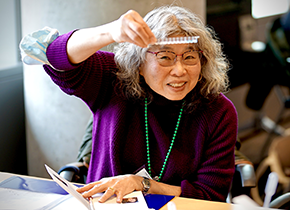
Location: Chicago & Round Lake, Ill.
Reach: 3,000 teachers from nearly 400 schools since 2009; more than 200,000 students.
We collaborate with Evanston, Chicago, and beyond to move relevant research out of labs and into the community.

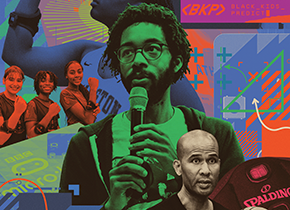
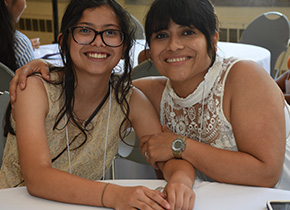
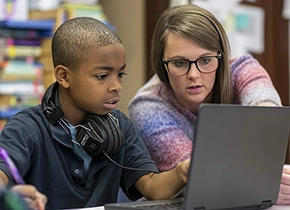

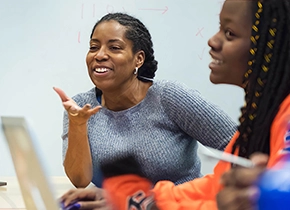

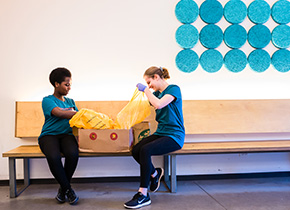
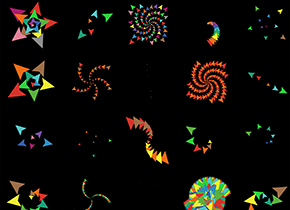
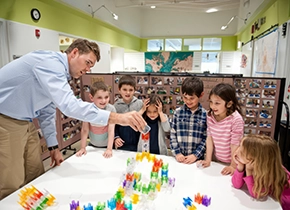
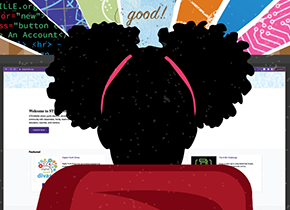
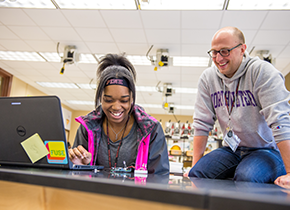
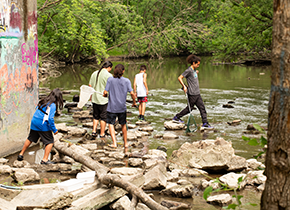
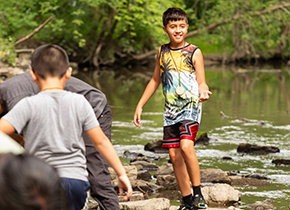
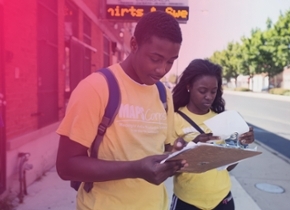
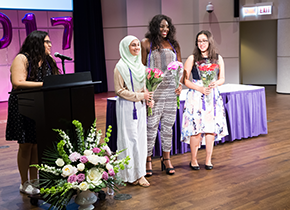
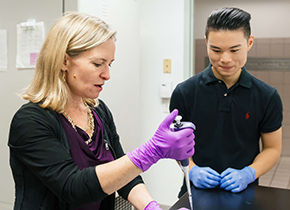
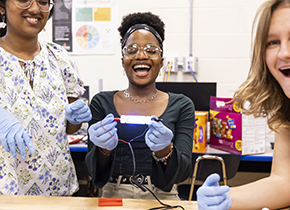
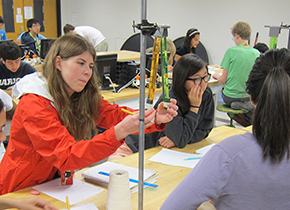
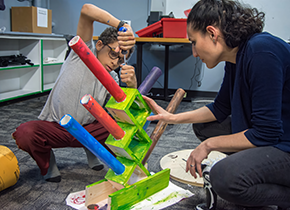
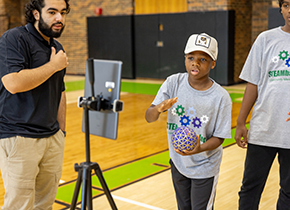
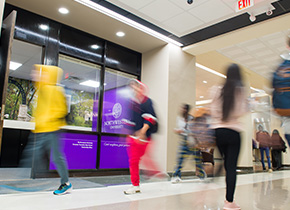
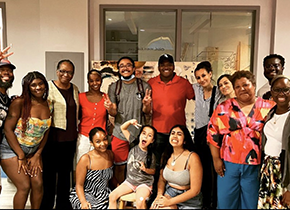
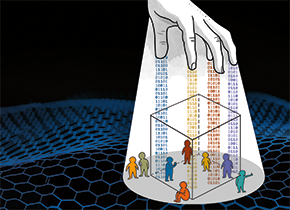

The Baxter Center for Science Education helps middle and high school science teachers learn about cutting edge science breakthroughs by providing professional development symposiums, hands on workshops, and free lab equipment for their classrooms.

A 6-to-10-week curriculum for middle and high school students that includes research-based activities, fieldtrips, and special events and can be used in or outside the classroom. Led by college-aged students from diverse backgrounds, the program emphasizes the practical uses of STEM education and learning to see data differently.

The Coughlin STEM Scholars program, established in memory of Northwestern alum and trustee Cathy Coughlin, provides talented middle school girls with three years of enrichment and accelerated STEM programming and academic guidance through Center for Talent Development, designed to prepare them for advanced coursework in high school and beyond. The scholarship covers the cost of all tuition and fees for programming. It is open to girls from the Chicago area who demonstrate interest and exceptional potential in STEM areas and who have financial need. Approximately 5-10 new scholars are identified annually.

A research practice partnership that produces relevant, timely information for educators that can be used to improve K-12 education and address educational inequities.

An initiative to design cultural and identity-based programming for children, youth and families in the Iranian diaspora. Research has involved studying family visions of education for their children as well as processes of co-design.

Cities Learn provides infrastructure to help communities use out of school programming. The program is a product of Northwestern University's Digital Youth Network, Nichole Pinkard’s research lab focused on designing more equitable systems for youth. The platform supports EL3 (Evanston learns in-school, out-of-school, and online), My Chi. My Future, and STEAMville.

Researchers are examining how chronic and everyday life stressors influence the lives of young people attending Chicago Public Schools. Studying the effects of stress on executive functioning, sleep hours and quality, emotions and stress hormone levels may help shed light on racial/ethnic and socioeconomic disparities in education.

Founded at Center for Talent Development in 1999, the Civic Education Project (CEP) offers promising young people opportunities to learn and serve in communities across the country, developing the knowledge, experience, and leadership skills they need to make a positive impact on the world. In all CEP leadership and service-learning courses—online, weekend, summer residential—students identify concrete ways to make a difference in their communities through research and reflection on a topic of interest that inspires them to create change.

The Computational Thinking in STEM project provides free computational thinking lessons, assessments, and technology for educators. During the summer, a four-week professional development workshop brings teachers together with the CT-STEM team to brainstorm ideas and cocreate curricula that teachers can use in the coming school year. After a review by instruction design experts, the materials are made available for public use on the CT-STEM website.

A design partnership with Bennett Day School and Bennett Labs to collaborate on technology designs for learning. Active projects include developing productivity apps to support teacher enactment of project-based learning activities.

Founded by Nichole Pinkard and now part of her lab, the free Digital Youth Divas program brings together more than 60 middle school girls on Saturdays, where they socialize, learn, and work on projects that include coding and 3-D design. Older girls and young women—Evanston Township High School students and Northwestern undergraduate STEM majors—mentor the younger girls.

FUSE is a collaborative, student-driven learning community with STEAM-related “challenges” that are designed around student interests in music, design, and pop culture. Teachers act as facilitators, guiding the process of exploration and discovery by encouraging youth to problem solve, take risks, express creativity, and learn with and from their peers.

The Indigenous STEAM Collaborative engages youth in land and water-based STEAM education and develops educational resources for teachers and communities. The project co-designs with Indigenous youth, families and communities in (re)making relationships with lands and waters towards sustainable and culturally thriving futures.

A curriculum and pedagogical model that uses field-based science education outdoors, including gardens for children in pre-kindergarten to fifth grade and beyond. Learning in Places emphasizes racial equity, ethical, evidence-based decision-making, and just relations with the natural world.

MAPSCorps is a national model for training and employing high school and college students to work in STEM as community data scientists. The initiative helps children from underserved communities learn how to use, collect, and analyze large amounts of data to make their communities healthier and more vibrant. It also serves as a pipeline for potential data science and STEM careers.

The Morton Schapiro Northwestern Academy for Chicago Public Schools is a free, multiyear college access and enrichment program for diverse, academically motivated students. Students receive personal enrichment, leadership development, college advising, and cultural and civic engagement opportunities as they prepare for top-tier colleges and universities.

A research-practice partnership that collaboratively leverages the expertise of researchers and practitioners in and out of school to promote the learning and development of the young people of Evanston and the world beyond.

Northwestern has more than 100 substantial partnerships with Evanston Township High School. The mutually beneficial relationship between the two communities spans disciplines and boundaries, crossing into academics, athletics, health and wellness, identity and social consciousness, college and career education, cultural events, mentoring, arts, and community engagement.

OpenSciEd develops research-based curriculum materials and professional learning programs to help science classrooms become places where students see their science work as connecting to their interests and questions their classroom has identified. Brian Reiser’s NextGen Storylines Project is part of OpenSci Ed.

A collaboration to develop transdisciplinary curriculum. Together with students and families, scholars and educators use a co-design approach that draws on community knowledges and visions to reimagine STEAM, literacy and civics education.

Part of Nichole Pinkard’s lab, STEAMbassadors trains college-bound 18 to 24-year-olds from under resourced communities to work with youngsters whose neighborhoods lack learning opportunities and role models in the fields of computer science, engineering, and the arts. STEAMbassadors are assigned to a neighborhood organization that partners with Chicago Department of Family Support Services programs in parks, libraries, and schools to help build an out-of-school learning ecosystem across the city.

Students from Evanston Township High School and Northwestern study historical, current, and future struggles for educational justice and engage in community-based design research. The for-credit course is taught by Northwestern faculty, graduate students, teachers from ETHS and the local youth workers. Researchers are studying intergenerational teaching and learning in this context.

Brings together Northwestern faculty members, graduate, and undergraduate students with educators from the McGaw YMCA to co-design justice-oriented making/STEAM programming for middle school youth, educator learning, and collaborative research.

The Young People’s Race Power and Technology project (YPRPT) is an out of school learning initiative designed specifically for middle school and high school students in the Evanston and Chicago-area. The program offers an innovative research-based curriculum that empowers youth to explore, engage, critique, and reimagine the role of technology in their neighborhoods, schools, and communities.